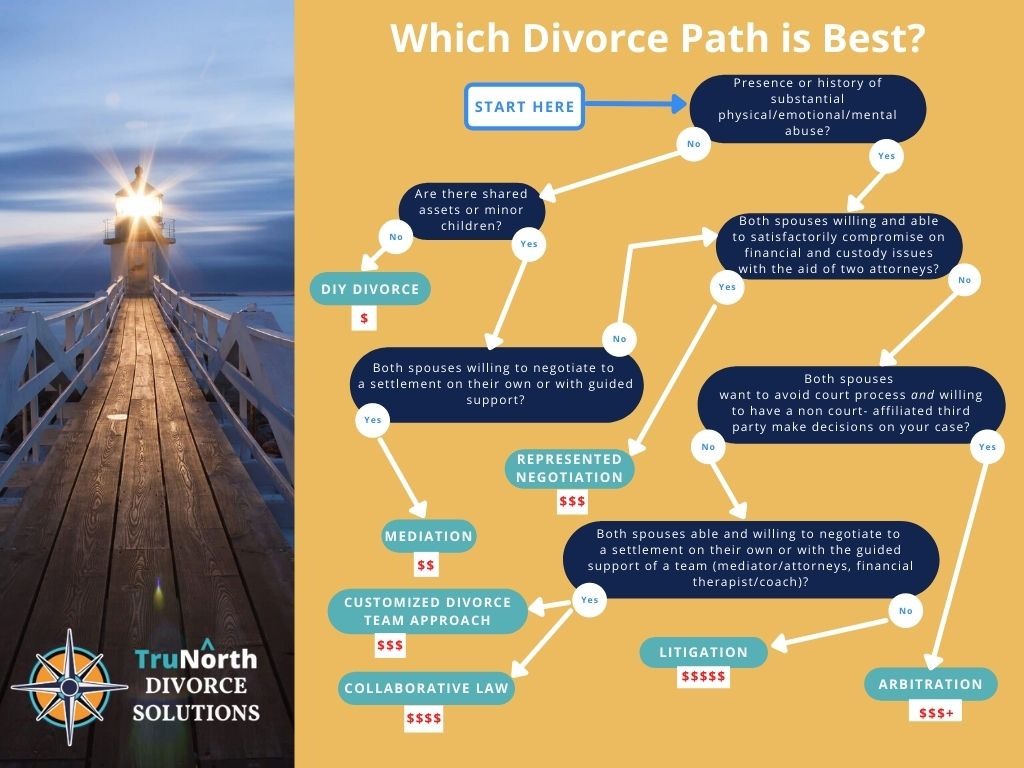The complexities of a divorce case depend on a variety of factors, including how long you were married, the residency requirement laws in your state, whether you have children together, own a home together, have significant differences in your income, are self-employed, unemployed, or have debt or joint assets.
If that sounds like a lot, it’s because it is! Don’t worry, TruNorth Divorce is here to help you decode divorce. Your first major decision in divorce is choosing the right divorce process and team of professionals for your divorce. In our previous post we outlined six alternative processes:
- DIY
- Mediation
- Negotiated representation
- Litigation
- Arbitration
- Collaborative divorce
This article addresses the criteria/questions you need to ask in order to choose one of these processes.
What are the Decision Criteria for Choosing a Divorce Process?
- Presence or history of physical or significant emotional abuse.
- If this is an issue, hire an attorney.
- The complexity of marital assets; do you share property, retirement accounts, or other financial assets together?
- If you share assets, rule out a DIY divorce. The mistakes you are likely to make will cost you far more than the expense associated with professional assistance. Settlement agreements are a one-shot deal and can’t be revisited after the divorce.
- Presence of minor children; the process of divorce can be more complex when separating with children.
- Here again, a DIY divorce should be off the table. Unless you are in full agreement on parenting time, responsibility for important decisions affecting your children, expenses, relocation, etc., you need help developing a comprehensive parenting plan. This can be accomplished in mediation or an attorney-lead process.
- Whether one spouse will actively or passively resist or stall the divorce beyond an acceptable waiting period.
- You’ll need an attorney to establish a firm date of separation or get the divorce process started. Don’t, though, get sucked into litigating your divorce in court. Ask the attorneys you’re considering what percentage of their cases are settled out of court. If attorneys are required, negotiated representation is going to be less expensive than litigation. Also, you may still be able to mediate specific issues around custody, support, and division of marital assets and limit the attorney’s role to handling the legal process and those issues you aren’t going to be able to compromise on.
- Do you already know your spouse and you will not agree to a settlement of financial issues and/or custody?
- Being amicable with your spouse is not necessarily a requirement for mediation but negotiation is. It takes two to negotiate a settlement, and the ability and willingness to do so is the number one requirement for whether mediation can be successful. If you or your spouse will resist the divorce or have demands that can’t be met in compromise, you’ll need the assistance of an attorney.
- Amount of money and time you’re willing to spend on the divorce; Know your full financial picture before you begin, as the cost of divorce, as well as scheduling time off work for meetings, can far exceed your original expectations.
- Attorney-lead processes and, especially litigation, can get expensive fast. How much is it worth to you to avoid a contentious battle that may cost tens of thousands or more? Is what you aren’t willing to compromise on worth the extra attorney fees and emotional cost?
- Your court’s backlog of cases; due to the pandemic your local court may be bogged down by cases and take much longer than typical divorce litigations.
- Even if you think your case might need to be litigated, you may want to consider arbitration and avoid the cost, time, and lack of confidentiality issues that come with a court-driven process.
- Your need for privacy: do you want to keep the details of your divorce and finances away from public access?
- If you want privacy, you need to keep your divorce outside of the court process, i.e., don’t litigate
- The intensity of and ability to manage anger or grief; divorce causes varying emotional states to arise that range from anger to lowered self-esteem, to resentment and depression. How able are you to handle a contentious process–are you prepared to handle the toll of stress that arises from confrontation with your former spouse?
- Consider your emotional health and the impact it might have on your well-being, job, parenting, and more. It is another cost that needs to be factored into your decision on the divorce process. Attorney-lead processes are almost always contentious. You might consider a collaborative divorce (not necessarily Collaborative Law), that provides the assistance of mental health or other professionals on the team.
- Ability to express your needs to one another and be heard; this is a key skill in making the divorce cost as little time and money as possible.
- Being able to negotiate and compromise requires good communication skills. A good mediator can assist you with this but if it’s a “my way or the highway” situation, seek an attorney.

I hope that decrypts some of the confusion over what you should consider as you decide which divorce process works best for you. If you’re looking for more divorce guidance, please click over to my free eBook, Divorce Financial Planning Guide . Otherwise, schedule your TruNorth Divorce complimentary strategy session today.
[/et_pb_text][/et_pb_column][/et_pb_row][/et_pb_section]
